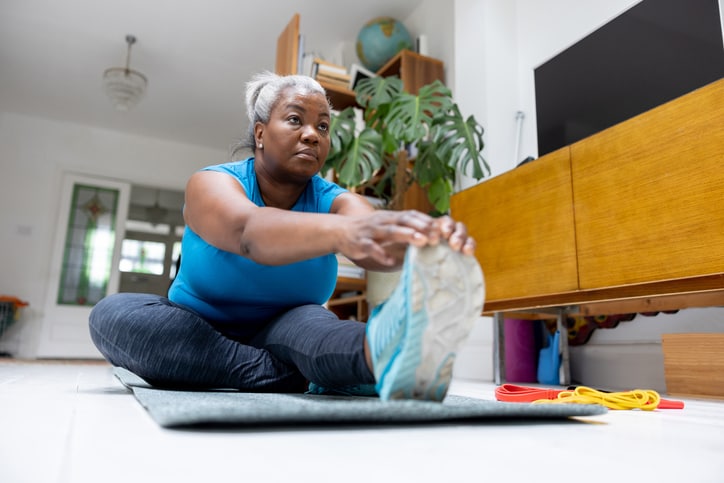Caring for an older or ill loved one looks different for every family caregiver, but they generally all experience one feeling: caregiver guilt. Whether guilt arises from feeling crunched by an overwhelming number of care tasks within a set period of time, worries of neglecting other relationships or a caregiver’s concern that they’re not being kind and patient enough with their loved ones, it’s the rare family caregiver who never has at least a pang of feeling like they’re falling short.
“Guilt is probably one of the most prevalent emotions that caregivers experience,” says Christina Irving, a licensed clinical social worker and director of family services for the Family Caregiver Alliance, who says the triggers for caregiver guilt are multifaceted. “There’s very little that people don’t feel guilty about.”
Allison Applebaum, a psychotherapist, founding director of the Caregiver Clinic at Memorial Sloan Kettering and author of “Stand By Me: A Guide to Navigating Modern, Meaningful Caregiving,” agrees and identifies two main types of guilt:
- Neurotic guilt: Caused by the feeling of letting someone else down
- Existential guilt: Stems from caregivers feeling like they haven’t lived their own lives to the fullest or like life is passing them by
The occasional twinge of either type of guilt may be inescapable for a busy family caregiver, but when guilt builds up, it can cause significant distress, affect both physical and emotional well-being and lead to or exacerbate caregiver burnout.
In fact, guilt is an emotion that caregivers can treat as a warning sign, says Applebaum. “Guilt is actually an incredible red flag,” she says. “It can be a really beautiful motivator that we as caregivers, and as humans, can use to examine how we’re functioning.”
Here’s a closer look at how and why caregiver guilt arises, how it can affect you and seven strategies for managing and reframing this complex emotion.
“Guilt involves a judgment. It’s complicated, and it really exacerbates all the negative emotions.”
—Allison Applebaum, a psychotherapist and author of “Stand By Me: A Guide to Navigating Modern, Meaningful Caregiving”
Why caregiver guilt comes up
Although stepping in as a family caregiver can be highly rewarding, it’s also a stressful and demanding role. According to the most recent AARP report “Caregiving in the US, which was conducted in 2020, more than 50% of caregivers rate their emotional stress from caregiving as moderate (28%) to high (36%). The average family caregiver spends nearly 24 hours per week on caregiving — time that may clash with other needs and wants, such as taking care of kids, working or enjoying hobbies or social time. That tension between competing needs can set caregivers up for guilt. Here, additional reasons caregiver guilt creeps in.
Caregivers may worry they’re not spending enough quality time with an aging loved one
Even though caregiving is so time consuming, family caregivers may worry they aren’t spending enough quality time with their loved ones. This is a challenge that may arise especially for long-distance caregivers.
“There’s the pressure of wanting to be that loving, caring, supportive person, especially in the face of an illness or a progressive condition,” says Irving, who adds that sometimes those who have had a difficult relationship with their loved one may hope to repair that relationship at the end of life — a time when doing so may be especially hard under the strain of caregiving.
Rebecca Jones, an educator and writer in Birmingham, Alabama, cared for her father through vascular dementia at the end of his life. A mom of two young boys, she says “guilt and sadness were daily occurrences” and that she felt torn between time with her young family and attending to her father’s needs. Even when he was being cared for in a facility, she experienced guilt when walking away from the facility while he was lying in a bed. “[That] was probably the most overwhelming guilt I’ve felt,” recalls Jones.
They may fear they could stand to be more patient and loving
Caregivers may also experience guilt if they feel they aren’t patient or loving enough with their ailing loved ones. Then, there’s the challenge of feeling bad about feeling bad, since it’s normal for caregiving to provoke difficult emotions such as anger, frustration or resentment. “Guilt involves a judgment,” says Applebaum. “It’s complicated, and it really exacerbates all the negative emotions.”
They may get guilt tripped
Family relationships can also add to guilt — especially in cases where the dynamics are complicated. Other relatives, or the care recipient, may put pressure on the caregiver, whether inadvertently or deliberately.
Tamara Toby is a Sacramento, California-based teacher who, along with her three siblings, has been caring for her mother since 1996. She says her mother — who suffers from bipolar disorder and a host of physical ailments — heaps on the guilt when she and her siblings don’t visit her as often as she’d like. “We feel guilty, but just don’t have the time,” says Toby. “We do the best we can when we’re not working, even if it’s just to get a cup of coffee.”
Even when the care recipient doesn’t intend to guilt trip their caregiver, such feelings can surface over missed moments together. Kim Owens, a blindness advocate and former sandwich caregiver who lives in Statesboro, Georgia, recalls a moment during her mother’s final illness: “She just wanted me to lie down and watch a movie with her and eat cookies, and I did not have the time for that. I remember feeling so guilty. I was doing all I could do, and yet the one thing she was asking me for felt impossible.”
Although Owens’s mother died more than 20 years ago, and Owens has since been a caregiver to father and to her son through vision loss, the memory persists. Such lingering memories point to the importance of tackling caregiver guilt before it becomes overwhelming.
“My number one tip when you feel guilty would be to take a moment and ask yourself, ‘In what way am I letting myself down? In what way are my own needs being neglected?’”
—Allison Applebaum
How guilt affects well-being
Caregiver guilt can be a vicious cycle. “The strain of caregiving creates a lot of guilt, but guilt enhances that stress and strain,” says Irving. “That can put additional pressure on the caregiver to try and do more than is physically possible.”
Overdoing it out of guilt may lead to physical strains or injury, or to such stress-related problems as higher blood pressure or insomnia, says Irving. In turn, she points out, that could lead caregivers to unhealthy coping mechanisms such as drinking. Caregivers who feel guilty due to time constraints also may neglect their own medical needs. The AARP report notes that 57% of high-intensity caregivers report having difficulty caring for their own health. (High-intensity caregivers are those who score a 4 or 5 on a five-level index measuring hours of time spent on care and amount of assistance provided.)
The mental health effects of persistent or prolonged guilt are also severe. “Guilt can exacerbate distress, anxiety and depression,” says Applebaum. “And when you’re feeling weighed down by guilt, that makes it harder to seek help, access social support and engage in self-care. It can be very impairing.”
Although these effects present a huge challenge for exhausted caregivers, there’s good news too, says Applebaum: “Guilt is actually one of the emotions that we have the greatest control over,” she says. (More on that in a moment.)
Tips to manage caregiver guilt
So, how can caregivers experiencing guilt move past this common emotion? The answers lie in a mix of seeking support, taking needed breaks and conscious efforts to shift your perspective. Here are seven strategies you can try for managing feelings of guilt before they become debilitating.
1. Reflect on what you need to thrive.
It may sound counterintuitive, but as Applebaum notes, guilt often signals unmet needs for the caregiver. “My number one tip when you feel guilty would be to take a moment and ask yourself, ‘In what way am I letting myself down? In what way are my own needs being neglected?’” says Applebaum.
By setting boundaries around your time and resources of energy, you can find better balance — and ultimately, less guilt.
2. Seek support in community.
Talking about your challenging emotions with other caregivers and/or good friends can normalize them, says Irving. “Connecting with other caregivers is often the most impactful. They can validate your feelings.”
If you don’t have friends who are fellow caregivers, ask disease advocacy organizations, social workers or patient advocates for referrals to support resources or look online. Social media sites, such as Facebook, have a wide range of caregiver support groups, which can be easier for time-strapped caregivers to access than in-person groups.
“If I don’t take care of myself, then I’m really short with Mom and other feelings come up. Then, I know I need to be doing a little bit more for myself.”
—Tamara Toby, a family caregiver in Sacramento, California
3. Try externalizing.
If you’re stuck in guilt, imagine what a loving friend would say. Applebaum says she often works with patients who feel guilty even about carving out the time for therapy. “I’ll say, ‘What would your best girlfriend say to you in this moment? Would they say, ‘Yeah, you’re a total jerk for coming to therapy with Dr. Applebaum?’” Or would they say, ‘I’m so proud of you for taking the time to go to Dr. Applebaum so that you can have the support that you need?’”
4. Refocus your thoughts on what you’re doing well.
Often guilt stems from feelings of inadequacy, as Irving notes. “Reframing some of that negative thinking and self-talk to think about everything you have accomplished can really help,” says Irving. She recalled participating in one caregiver workshop where participants were given notebooks with the header “Accomplished” so they could make a list of everything they had done — not a list of everything that remained to do. If you start feeling inadequate, try making your own “I did it!” list, and congratulate yourself on your work.
5. Ask for help, including respite care.
Only 14% of caregivers use respite services (which provide temporary care either in or outside of the home), according to the AARP report, but breaks and practical support from friends, family and professionals can lessen pressure and help you escape the guilt cycle. “It’s not just for you,” says Irving. “Your care recipient will benefit, because you will be in a better place when you come back from breaks.”
6. Take breaks and engage in activities you enjoy.
In order to manage her guilt and feel better overall, Toby joined a bocce club and takes frequent walks to decompress. “If I don’t take care of myself, then I’m really short with Mom and other feelings come up,” she says. “Then, I know I need to be doing a little bit more for myself.”
7. Seek therapy if possible.
Working with a mental-health professional can present challenges for time-strapped caregivers, but a therapist can offer critical support to get through a hard time when you’re in the midst of caring for a loved one or process lingering emotions after caregiving ends. As Owens says, “Going to therapy has helped me acknowledge that I did the best I could.”
The bottom line on caregiver guilt
Even though most if not all caregivers will experience guilt from time to time, it’s important to remember that it doesn’t have to be constant or debilitating. If you start to feel stuck in guilt, turn to strategies such as reframing and connecting with others to shift your perspective.
“Guilt can be something that weighs heavily and dramatically impairs the caregiver’s experience,” Applebaum acknowledges. Or, if you take the perspective that guilt can direct you to tend to your own needs, she says, “it can promote growth.”




